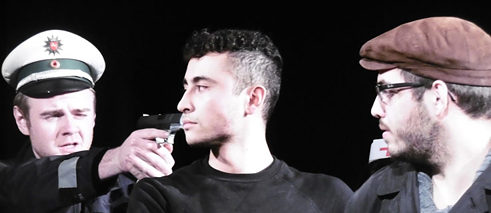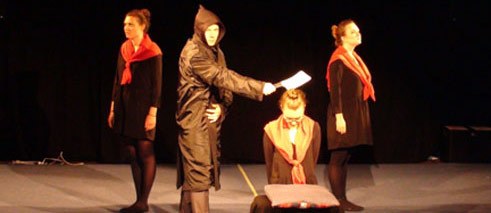Anke Stöver-Blahak
Poetry for engineers

Why would a mechanical engineer need poetry? – How a non-content-based class can be vocational nonetheless….
Engineers, or so it is generally thought, have no linguistic or artistic talent and no interest in art. Consequently, when thinking about how to provide linguistic preparation or support to engineering students, the focus in many cases is on German as a foreign language lessons with a solely content-based or technical language orientation.
Language courses offered at Leibniz Universität Hannover (LUH) reveal that engineering students find courses with an entirely different and more holistic approach and content to be useful and helpful in their studies.
starting situation
During the many years that I have worked as a German as a foreign language tutor at the LUH, I have observed time and time again that students had problems articulating full sentences with fluency and appropriate intonation. Wondering how best to improve these particular skills, I first thought only of giving the students ready prepared texts so that they would not have to worry about content or grammatical correctness. But which texts would be suitable? Would it make sense for instance to find a technical text about mechanical engineering so that learners could practise reading it aloud repeatedly over an extended period, improving their phonetics and intonation and learning to speak at a reasonable speed while making appropriate gestures and facial expressions? And should each student choose their own texts? Would they be able to distance themselves from the content and concentrate on the language? I felt that this would not really work, but believed it would be different with poetry or theatre plays – ready-made texts in “beautiful” and condensed language.Arguments in favour of lessons involving poetry and theatre plays for engineers learning german
- Learners can relate not only cognitively but also emotionally and physically to poems and theatre (= art).
- Art offers many possible interpretations for individuals and prompts discussions within the group.
This allows students to
- practise speaking correctly (phonetics, intonation, prosody)
- practise appropriate presentation behaviour (stance, facial expressions, gestures, volume, contact with audience)
- develop their self-confidence and reduce their fears
- learn to give and receive well-founded feedback
- work on goals they have set themselves in a self-determined and autonomous way, as well as in an exchange with others
Formats
 © Anke Stöver-Blahak, Foto: Privat
I developed two course concepts at the LUH which follow such holistic teaching/learning principles.
© Anke Stöver-Blahak, Foto: Privat
I developed two course concepts at the LUH which follow such holistic teaching/learning principles.
- Using poetry to practise speaking and presenting
- Oral communication using theatrical methods
What both courses have in common is the fact that students adopt a role that allows them to put on a “mask” that protects their own identity, allowing them to present a German text to an audience as if they were someone else. This enables them to internalize the foreign language and become more confident in speaking and presenting. They learn to perform and to analyse how others perform by actively doing so themselves and giving feedback to others.
Arguments for the success of participants
Students are evaluated throughout the course, highlighting the following aspects so that participants can see the progress they are making themselves:- language (speaking and vocabulary)
- acting and performative learning
- intercultural learning, perception of cultural differences
- working in a group, giving feedback, cooperative learning
- building self-confidence in terms of performing and in terms of the German language
“I do not know how many German poems I will recite in the future, but I will certainly need consonants – every day.” Ryan, in a Skype interview (Stöver-Blahak 2013)
“Speaking of which, the course helped me a lot, especially to overcome my nervousness and learn how to greet people properly. My job interview went very well.” Pedro, e-mail from 4 June 2013

Conclusion: German as a foreign language lessons for engineers should not only include teaching of technical language, which of course is very necessary, but should also encompass methods from theatre, poetry or music so as to address and support students on all levels.
Quellen
Stöver-Blahak, Anke (2012), Sprechen und Vortragen Lernen im Fremdsprachenunterricht, Frankfurt, Peter Lang
Was ist ein Ingenieur? (Zugriff:03.03.2016)
Fachsprachenzentrum mit Beispielvideos
Fachsprachenzentrum: Anke Stöver-Blahak
about the author
After passing her second state examination, Anke Stöver-Blahak spent a year working as a lector in China. Since 1989 she has worked in German as a foreign language at Leibniz Universität Hannover.
She was a member of the board of the Fachverband für Deutsch als Fremdsprache (the Professional Association for German as a Foreign Language) and is currently coordinator of the German department at the Centre for Applied Linguistics and Special Languages (FSZ) in Hanover.
In 2012 she obtained her PhD with a thesis on learning how to speak and present in foreign language lessons.
